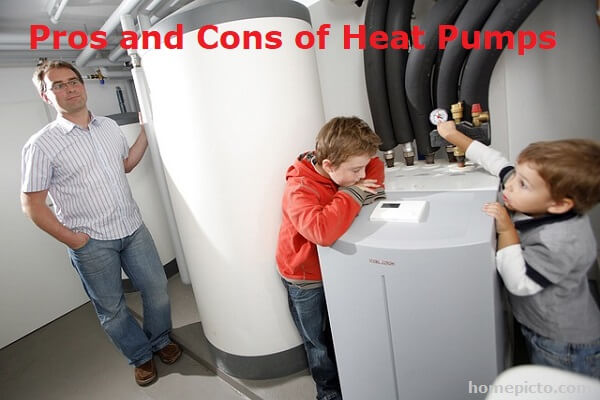The heat pumps are the newest and best residential heating and cooling technology. Heat pumps provide certain benefits, but they also have some downsides. Let's discuss the pros and cons of heat pumps.
When compared to their HVAC Systems, heat pumps have the following advantages:
When compared to electric heaters, heat pumps are far more efficient or capable.The reason a heat pump's efficiency is so much higher is now under doubt.It is due to their heat transmission mechanism.Heat pumps transfer heat from the outside of your home to the interior.The mechanism of an electric heater creates heat by passing electricity through the heating coil.Compared to a typical electric heater, the heat pump has a significantly more significant amount of performance.
The ratio of how much cooling or heating a heat pump offers to the energy it consumes is known as the coefficient of performance.For instance, a heat pump that requires two kW of electricity to produce six kW of heat will provide three kW of heat in one kW of power if its coefficient of performance is three.
The electric heater has a lower cop than a heat pump. Nearly all electric heaters have a COP of 1. The heat produced by electric heaters is equivalent to the energy used. For instance, a 1.5 kW electric heater uses 1.5 kW of power while making the same amount of heat.
The least expensive choice is heat pumps. When compared to electric heaters, it is not just less costly to operate. They are cheaper than gas furnaces as well.
Heat pumps use electricity to produce heat, and gas furnaces burn gas to produce heat, so they cannot compare them.Heat pumps are taken as less expensive than gas pumps when power and gas prices are.
Gas furnaces have a disadvantage since there is a chance that gas will leak out while it is generating heat. Gas leaks provide a significant risk and might result in fire explosions, making them hazardous.Heat pumps heat your home using combustible gas; they don't put you at risk of gas fires or explosions.
Fuel-burning in gas furnaces generates heat. Hazardous chemicals, including nitrogen oxides and carbon monoxide, are produced during the burning of flue gases.
You can't smell, taste, or see carbon monoxide gas, which is toxic and invisible. To you and your family, carbon monoxide poses a severe risk.But the hazardous combustion gases are eliminated by an exhaust system. The dangerous gas can enter your home's air if there is a leak in the exhaust system. Since heat pumps use electricity to heat, there is no chance that any carbon monoxide will escape.
A standard gas furnace is less environmentally friendly than a heat pump. Heat pumps don't burn renewable sources.Heat pumps and other clean energy technologies are essential for combating climate change, lowering energy prices, and lowering threats to the power grid.
Heat pumps have some drawbacks compared to conventional heating systems, including higher upfront installation costs, higher electricity usage, susceptibility to power outages, and lower efficiency in colder areas. All the drawbacks are explained in depth further down.
Installing a heat pump costs more than installing a gas furnace. A heat pump is an excellent solution for cooling and heating your house.Installing a gas furnace is trickier than installing a heat pump. Heat pumps only require the installation of two pieces of equipment, whereas a gas furnace and an AC require the installation of three.
Heat pumps require electricity to move heat between your home's interior and exterior. Heat pumps consume more electricity as compared to gas furnaces. Your electricity and heat pumps will cost more if power rates are higher.
It could not be accessible if your home's electrical infrastructure needs to be more significant to handle the added electrical load. To improve your electrical services, you must pay an additional fee to an electrician.
One disadvantage of heat pumps is that they require electricity to operate. If the power fails or goes out, it won't function.Installing a backup generator will be one alternative in an outage.Utilizing a heating source like a gas heater is another choice.
Your home's interior is heated by the heat pump using heat from the outside. A heat pump will have problems extracting heat from the outside air if the temperature is too low.
If the temperature drops below 30 degrees, heat pumps will turn off. The most recent heat pumps don't have such a problem because they work in all temperatures. The heat pump goes off, and the backup heater comes on if the ambient temperature drops to zero degrees.
Conclusion
As you determine the proper need, you learn about the advantages and disadvantages of the system, including the heat pump and gas furnace. They should also take the house design and budget. Call your neighborhood dealer for advice on the most effective heating solution.

In colder climates, air source heat pumps may have problems like icing, which could cause system damage. Modern heat pumps do, however, frequently provide automated defrosting. Their performance and efficiency will also suffer in frigid temperatures, and they use more electricity on cold days.
The Most Common Heat Pump Issue is weird noises.There are two different forms of noise. Rattling sounds indicate that the heat pump's internal components are loose. Or squeaky noises indicate a problem with the pump, and you need to call a repairer or expert to inspect your heat pump.
Your electricity price will go up if you use a heat pump, but your costs for other heating fuel will decrease.Your monthly electricity cost will increase daily by $50 to $100 for each heat pump unit (often known as a one-to-one).
You should clean your home and return your home's supply and any bent fins. Your heat pump needs to be serviced by a qualified expert for at least a year. The following tasks are within the technician's capabilities: Examine the ducts, filters, blower, and interior coil for debris and other cleaning blockages.